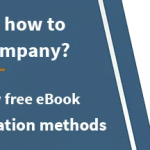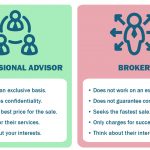If you have decided to sell your business, it is normal to have those doubts. The good news is that the questions you are asking yourself are probably the ones we have already answered for our clients.
In this article, we will answer the top 10 questions when selling a company that entrepreneurs who are thinking of selling their company ask themselves. Not just the most frequent ones but also the most concrete ones.
Top 10 questions of entrepreneurs when selling their company
Among the top 10 questions when selling a company, entrepreneurs have personal, economic and operational concerns. Let’s take a look at them below.
1. How is the confidentiality of the company’s sales process guaranteed?
Depending on the market in which they operate, it is natural for entrepreneurs to be concerned about keeping the news of the sale strictly confidential.
In the Anglo-Saxon world, selling the company represents a triumph and is a mark of success. On the other hand, the perception is very different in the Spanish market. An entrepreneur may fear that selling is perceived as a sign of decline or failure.
Nothing could be further from the truth. Normally, companies that are sold are companies with a proven level of success and great growth potential. That is why they find buyers.
“I am concerned that my company’s name will be compromised in the marketplace.”
Moreover, for the entrepreneur, the sale represents a strong financial return. This can be a great reward for a lifetime of hard work.
Knowing these different perceptions of the transaction, and its impact on the entrepreneur and the market, is the responsibility of a good advisor. This M&A specialist understands the entrepreneur’s needs and does not judge them.
On the contrary, they can shield every aspect of the entrepreneur’s concerns.
In the case of the sale, confidentiality is guaranteed through proper NDA procedures and the correct selection of potential buyers or counterparties. Conflicting counterparties are avoided. The expert advisor focuses on qualified financial and industrial investors.
In addition, other phases are controlled, such as exchanging documentation using technology, such as a Virtual Data Room.
Find out more about how we guarantee confidentiality: Confidentiality in the sale of a company.
2. How do I know the buyers you introduce to me are the best?
The selection of counterparties is a critical process. The difference in the selection of the best counterparts lies in access to certain key resources:
- The best databases on the market.
- Knowing how to guarantee maximum traceability of contacts and control of these by the client.
- Maximum transparency of the entire process through monitoring tools. At ONEtoONE, for example, we have our platform, CLARITY. Through it, the client can consult the status of their mandate at all times.
- Having an international network with contacts in all sectors’ most important M&A markets. This guarantees access to the buyers who can pay the most, who do not necessarily have to be local.
The choice of strategy will depend on the type of company, the sector and the personal preferences of the entrepreneur.

Resources to find the best counterparts
3. What can I expect from the operation?
Selling the business can offer financial benefits, risk reduction, new opportunities, freedom from liability and the possibility of leaving a lasting legacy. For each entrepreneur, the expectations and possibilities are different.
The first and most obvious effect is that the sale provides considerable financial realisation. After years of hard work and dedication, selling the business can generate a significant return on the investment.
By doing so, the entrepreneur can secure personal financial stability or take advantage of new investment opportunities.
In addition, selling the business can free the entrepreneur from the responsibilities and pressures of running the business. This results in a significant reduction of stress and workload. Selling allows the entrepreneur to enjoy a better work-life balance.
The sale also provides the opportunity to pass control to a new owner who can continue to develop and grow the company while the entrepreneur can explore new interests or projects.
4. Will I have to stay on to run the company after the sale? For how long? What will happen to the employees and my family working for the company?
Among the top 10 questions, entrepreneurs ask themselves when selling their business is often a concern for their future and that of their team.
In our experience, there are no redundancies in the sale of family businesses. On the contrary, the buyer tries to motivate the management team to stay on.
Planning a smooth transition, ensuring the retention of key employees and ensuring continuity of customer service are essential aspects for the buyer. In doing so, it seeks to minimise negative impacts.
All the keys to a good sale in 11 keys to preparing for the sale of your business
As for the seller, showing the availability of some continuity helps a better sale. Commitment to permanence over time reassures the buyer of a transition without losing rhythm in production. This is a crucial element in building trust between buyer and seller.
At the end of the day, tenures do not usually go beyond 18 months or two years at most.
Finally, it is crucial to communicate clearly and transparently about upcoming changes, providing reassurance and maintaining the confidence of key stakeholders.
5. What happens to the company’s assets, such as the office, warehouses or storage?
There are two types of assets that a company owns: productive and non-productive. You will need to manage each of them differently.
- Productive assets are those assets necessary for the activity of the business, for example, specific machinery in a factory. This normally falls within the sales agreement.
- Non-productive assets are those that are not part of the company’s production process. It is preferable to remove them from the perimeter as soon as possible.
Real estate assets (warehouses or buildings where the company’s activity is carried out) are considered non-productive assets. Buyers are usually not interested in purchasing real estate assets.
“What happens if I have my second home in the company’s name?”
If the assets belong to the company, the usual practice is to spin them off from the company. The seller itself can buy the asset as an individual or through a holding company.
This obviously has several tax implications. Therefore, each asset has to be analysed to calculate the tax cost of the spin-off. If the demerger is carried out in good time, two years must elapse before these assets are considered tax neutral.
Finally, the purchaser may ask to lease the non-productive asset even if not interested in buying.
6. I have a lot of liquidity in the company. What do I do with it?
Surplus cash is also a question that creeps into the questions of every entrepreneur who wants to sell his company.
The company’s liquidity neither increases its value nor hurts the sale process. If there is a lot of liquidity, it is best to “get rid” of it.
The simplest way to distribute surplus cash is via dividends.
More on the company’s financial structure: How should you prepare the financial structure for the sale of your company?
7. What can I do if the company’s stock is bloated?
At certain times, such as when interest rates are so low, entrepreneurs may have decided to invest in buying goods or filling the warehouse instead of keeping money in the bank.
It may be that the sales process coincides with one of these times when the company’s stock is “bloated”. What to do with this surplus is one of the most frequent questions entrepreneurs ask themselves when selling their business.
The buyer understands that the working capital is what is necessary to continue the business.
However, if there is a surplus, the best thing to do is to reduce it as quickly as possible to demonstrate that the company’s working capital is lower than its historical level and to pay it out in dividends when liquidity is available.
Given that the average duration of operations can vary from 9 to 18 months, time is sometimes enough. Sometimes it is not. Sometimes you have to prove that these stocks are indeed inflated and that you can easily liquidate them. And that is simply a question of time.
8. Can I start the sale process without the agreement of all the company’s shareholders?
In companies with multiple shareholders, it is common for different views and objectives to exist among the shareholders. Even family relationships sometimes complicate these situations greatly.
Some shareholders may be interested in selling the company. Others may not. Even if they agree to sell, they may have different opinions about the right time to sell.
“My brother doesn’t want to sell, but I think we can convince him, can we start the process without him?”
Strictly speaking, a shareholder can begin the sale process by seeking potential buyers and evaluating options without requiring the unanimous consent of all shareholders.
However, the ability to close the sale of the company depends on the corporate governance structure and the provisions set out in the company’s bylaws. The by-laws set out the rules and procedures governing important decisions, and the sale is one such decision.
Therefore, the final decision to sell the company may require the approval of a majority of shareholders, depending on the applicable contractual or legal provisions.
Thus, it is not advisable to start the process knowing that a shareholder disagrees upfront. That shareholder will then have very high bargaining and decision-making power. Even if the transaction is delayed, it is advisable to have the mandate agreed upon by all parties involved.
9. Is it important to know if there are relevant operations in my sector? How can I find out which ones?
Knowing the relevant operations in the company’s sector is essential for a successful sale. This information is vital for several reasons:
- To obtain a proper valuation. You will be able to understand the context in which the company finds itself and assess its relative position in the market. A more accurate valuation of the company is then possible. The company’s real value can be determined by considering its financial performance, competitive position and growth potential. This is the way to establish a fair price.
- To generate attractiveness for buyers. Buyers interested in acquiring a company usually have a good knowledge of the sector in which it operates. By being aware of relevant industry operations, the seller can effectively communicate your business’s unique and valuable aspects. They can highlight their competitive advantage and growth potential relative to other companies in the same industry.
- To identify potential strategic buyers. Potential synergies or shared strategic interests can be identified by knowing which companies are active in the sector and have made recent acquisitions.
- To prepare the due diligence. During the sales process, buyers often conduct thorough due diligence or audit of the company. With information about the industry, the seller can anticipate potential areas of interest or concern for buyers and prepare accordingly.

Four benefits of knowing what relevant transactions have taken place in my sector.
All this information provides a great advantage in the negotiation with the buyer.
To have this information, it is necessary to have access to the best databases.
A professional advisor has such access, and his market knowledge allows him to interpret the data in the most advantageous way for the transaction.
10. Why do I have to pay you as a consultant? If I get a good offer, I sell. Isn’t it better that you present me with targets and take a position with the buying side?
It could do so, but that turns the transaction into a bilateral process. A bilateral transaction is a transaction between a seller and a single buyer.
In this type of transaction, the buyer is the one who pays the advisor. Therefore, the advisor will try to lower the transaction price as much as possible, which is a conflict of interest.
Experience has shown that buyers pay 20-30% less the sale price in a bilateral process than in a competitive process. The seller saves fees at the cost of a lower price and worse conditions for the sale.
The expert advisor: the best source of information to answer every entrepreneur’s questions when selling their business.
The questions listed above are some of the top 10 questions when selling a company entrepreneurs often ask themselves when considering the sale of their business.
By addressing these questions and seeking appropriate advice, entrepreneurs can be better prepared to make informed decisions and achieve a successful sale process.
Selling a business can be a complex and stressful process. It involves personal, financial, legal and strategic aspects.
A specialised advisor will assist you in contacting and negotiating with all shareholders. In addition, he or she will inform you of all legal and contractual obligations and requirements during the sale process.
Also, they have up-to-date information on competition, regulatory changes, industry risks, and other factors that may affect a buyer’s company assessment.
Selling a business is a significant decision that requires careful planning and consideration. Please do not hesitate to contact us if you are considering it. We are here to help you. At ONEtoONE, we can help you. Get in contact with us now.































